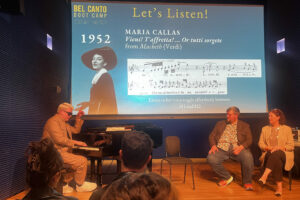

Despite its intricately layered postmodern concept, composer George Benjamin and librettist Martin Crimp’s work deals with one of opera’s hoariest scenarios: a doomed love triangle. Based on an incident that may have happened to the 13th century troubadour Guillem de Cabestaing and which was transformed by Boccaccio into one of the tales of The Decameron, a young itinerant artist is commissioned by a prosperous landowner to create an illuminated book (on parchment or “skin”) to show off his wealth and good taste to the world. The patron’s young, neglected and illiterate wife falls in love with the artist, who soon succumbs to her advances. The eventual exposure of their affair culminates in a horrifying act harking back to Atreus and Thyestes.
The opera, however, depicts anything but a straight-orward domestic tragedy. Presiding over the action are three present-day “angels,” seemingly secular figures who not only comment on the medieval action but also occasionally take part in it. One angel becomes the “Boy,” the artist whose hiring sets off the calamitous chain of events. The three are assisted by four silent “angel archivists” who busily go about the business of stage-managing the theatrical presentation the audience is witnessing by changing the props and helping the principals with their costumes.
Lit exquisitely by Jon Clark, Vicki Mortimer’s striking two level set is divided into four playing areas, and, while the major “action” occurs in the lower right quadrant, the angelic agents are often seen busying themselves in the two left-hand areas. This distracting feature of Katie Mitchell’s sleek Aix production is but one of the devices that purposefully distance the audience from the melodrama.
The three medieval characters frequently—but not always—self-consciously refer to their thoughts and actions in the third person, simultaneously enacting their drama while commenting on it. Occasionally jarring references are also made to the present day—comments alluding to the Holocaust or a shopping mall. These too serve to thwart our identification with the figures in the conventional “operatic” plot.
Benjamin and Crimp have admitted they struggled with writing opera in the 21st century, alluding to difficulties they see as inherent in an art form that dates back to the early 17th century. Part of their solution is to create a work which operates as much on an intellectual plane as an emotional one by commenting on the action as it proceeds. Rather than merely to infer the opera’s possible meaning, the audience is directly asked to reflect on an artist’s ability to transform life into something transcendent in a world fraught with violence.
The opera thus becomes an artwork about itself. The (literally) visceral impact of the love triangle’s denouement is undeniable thanks to Benjamin’s powerful music, yet I wasn’t very emotionally engaged or moved by the brutal fates of Agnès and the Boy. But it’s possible that that sort of conventional emotional engagement isn’t being solicited.
Crimp’s challengingly cerebral approach has been wholeheartedly embraced by Benjamin whose extraordinarily inventive and occasionally ravishing music enchants and intrigues. Contemporary operas seem so rarely to feature pleasing vocal writing but this one does—Benjamin clearly relishes singers and provides them with vividly dramatic music that is grateful to their voices while allowing them to convey Crimp’s pungent, never prosaic text. There are no traditional arias, duets or ensembles although vocal lines occasionally intertwine, as during the scene of the wife’s seduction of the reluctant artist.
Audiences concerned that a new opera must contain dissonant orchestral barrages or ear-punishing atonal vocal assaults have little to fear here. The 60-piece orchestra, which includes such unusual instruments as a viola da gamba and a glass harmonica, rarely rises to its full power. Despite the lurid subject, much of the music is quite delicate, with the vocal lines accompanied by a light and nuanced orchestration of extraordinarily varied colors. Alan Gilbert’s conducting of the Mahler Chamber Orchestra, the superb organization for whom Benjamin wrote this work, was extremely supportive to the singers allowing nearly all the text to be easily heard while deftly building the tension to its inexorable Grand Guignol explosion.
New York was also very lucky to experience the pair of singers for whom Benjamin composed the role of the landowner and his wife. Temporarily abdicating the title role in Barrie Kosky’s wildly acclaimed production of Handel’s Saul at the Glyndebourne Festival, bass-baritone Christopher Purves hauntingly embodied the implacable yet tortured Protector, as the protagonist is ironically named. While haughtily proud of his possessions which most prominently include his young and beautiful wife, he is also a high-minded aesthete nearly driven by bankruptcy in his single-minded quest to have his book made. Purves’s tortured revelation that the Protector too is in love with the Boy by furtively kissing him during an encounter in the woods was both shocking and moving.
As Agnès, Barbara Hannigan gave an electrifyingly kinetic performance, as palpably miserable as the Protector’s downtrodden wife as she was in her erotic longing for the Boy and, in a surprising and devastating scene, also briefly for her husband. Her clear, high soprano shimmered and stabbed in several demanding extended scenes, and her all-out dramatic commitment bravely shirked none of her character’s more unsympathetic actions. She was so impressive that one can easily credit her recent triumph as Berg’s Lulu.
Despite their period dress, both Purves and particularly Hannigan were directed to behave in a contemporary manner; their very 21st century demeanor added yet another layer of distance from the 13th century tragedy.
For those familiar with the Boy of Bejun Mehta, who sang the role at the world premiere at Aix and at Covent Garden where the opera was filmed for DVD
, English countertenor Tim Mead’s interpretation might have come as a surprise. Mead’s pure, vibrato-less voice has a much more ethereal luster than Mehta’s grittier, earthier timbre, and his simple portrayal was less conflicted, more earnest. The blend with Hannigan’s voice at the end of the seduction scene was ravishing. Victoria Simmonds’s mezzo proved a bit weak as the second angel, but Robert Murray as the tenor third angel was sturdy and forthright.
Whether or not Written on Skin is the out-and-out masterpiece that some have proclaimed it to be remains to be seen. While rave reviews and (as last night at Lincoln Center) loud ovations from capacity audiences for it continue, the same sort of reactions greeted Corigliano and Hoffman’s The Ghosts of Versailles at the Met nearly a quarter-century ago. Yet that opera’s star has since dimmed considerably. While there’s not yet been a chance to reflect and to experience varied interpretations, I do believe Benjamin and Crimp have created a serious and provocative work that demands and repays close attention.
I’d be curious to see it again and two performances remain this week at the Mostly Mozart Festival.
Benjamin’s next work is planned for Covent Garden in a few years, but first, during its 2016-17 season, the Metropolitan Opera will give New York audiences the opportunity to savor the other ecstatically praised recent opera which is astonishingly also based on the medieval troubadour tradition, Kaija Saariaho’s exquisite L’Amour de Loin.
Photos: Richard Termine
Win tickets to Piotr Beczala at Carnegie Hall!
pb—with our friends at Carnegie Hall—is giving away two tickets to PB’s December concert. Enter now!
pb—with our friends at Carnegie Hall—is giving away two tickets to PB’s December concert. Enter now!
-
Topics: barbara hannigan, lincoln center, mostly mozart, review
Latest on Parterre
Win tickets to Piotr Beczala at Carnegie Hall!
pb—with our friends at Carnegie Hall—is giving away two tickets to PB’s December concert. Enter now!
pb—with our friends at Carnegie Hall—is giving away two tickets to PB’s December concert. Enter now!
Reach your audience through parterre box!
parterre box, “the most essential blog in opera” (New York Times), is now booking display and sponsored content advertising for the 2023-2024 season. Join Carnegie Hall, Lincoln Center, Warner Classics and many others in reaching your target audience through parterre box.
parterre box, “the most essential blog in opera” (New York Times), is now booking display and sponsored content advertising for the 2023-2024 season. Join Carnegie Hall, Lincoln Center, Warner Classics and many others in reaching your target audience through parterre box.
parterre in your box?
Get our free weekly newsletter delivered to your email.



























Comments